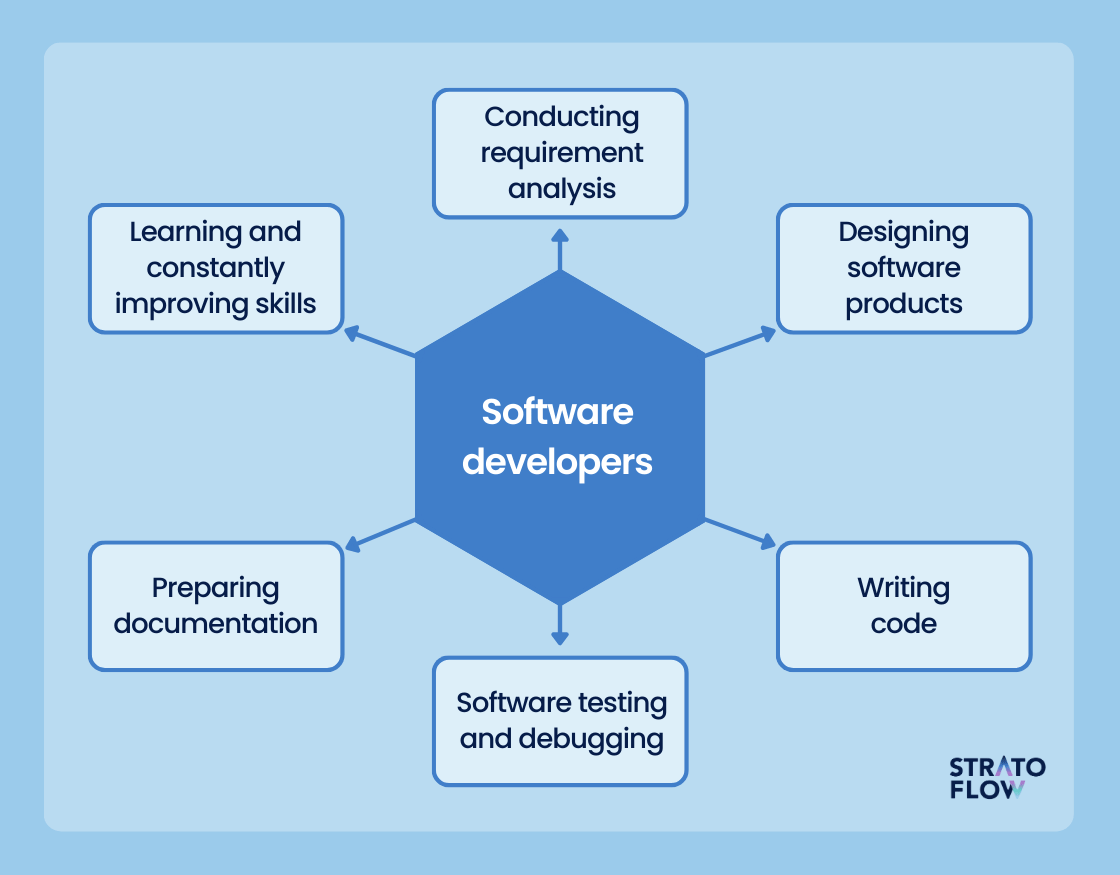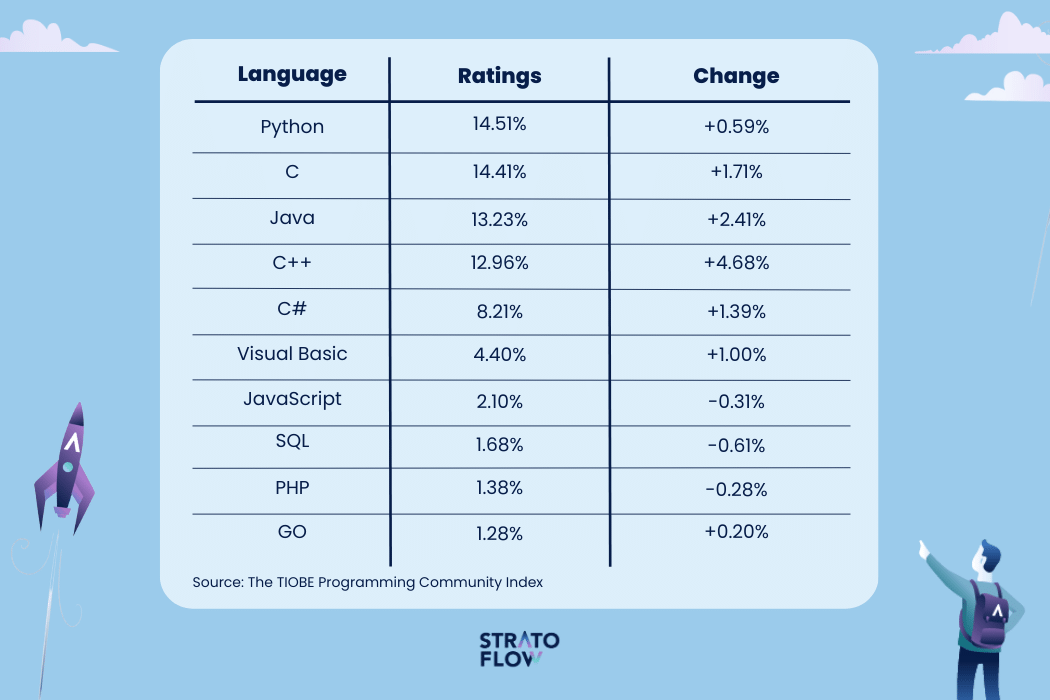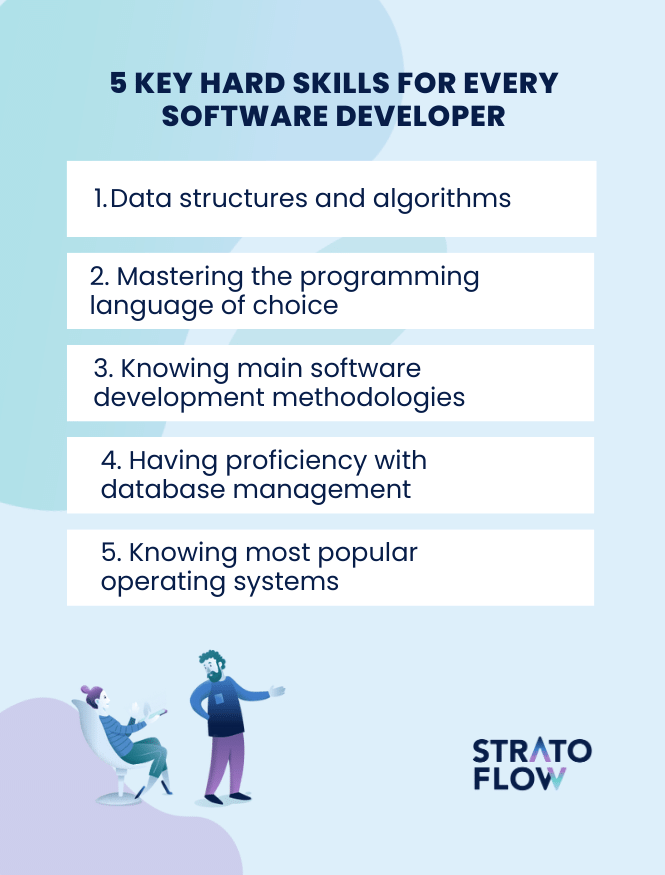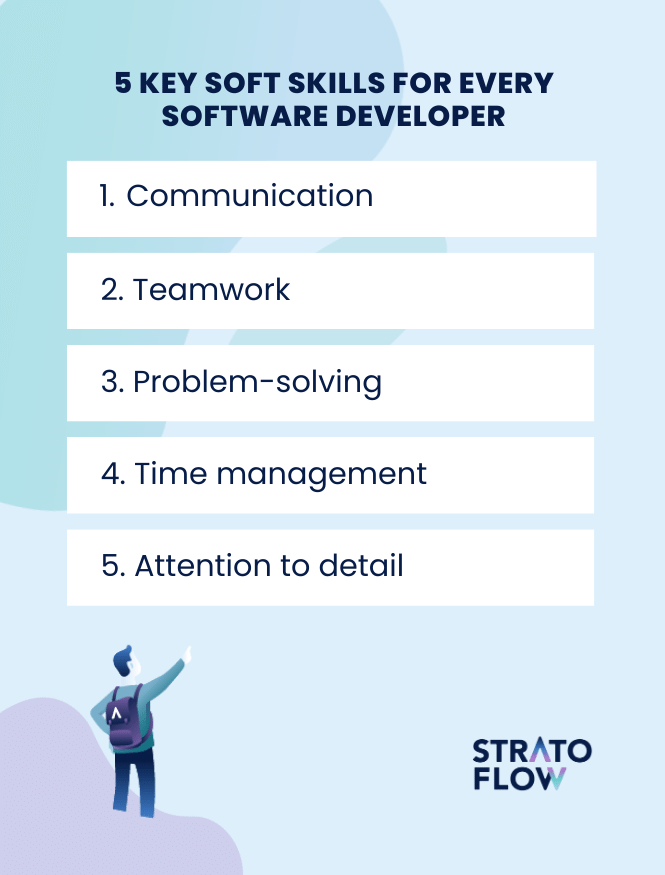
Who Is a Software Developer? What Does a Software Developer Do?
A job where you can easily earn five or six figures while working remotely is the dream of many people around the world.
Becoming a software developer promises just that – a well-paying position with a wide range of benefits. But these attractive salaries are not without reason. Highly skilled developers can create software solutions that are truly invaluable to the companies that hire them.
In this article, we take a deep dive into what it takes to be a programmer, what qualities and skills software developers need, and how they can take their careers to the next level.
Whether you are actively considering becoming a programmer or are a business executive looking to hire software developers, this article is a must-read.
Contents
- Who is a software developer?
- What does a software developer do?
- What’s the difference between a software engineer and a software developer?
- Key statistics on software developers in 2024
- 9 Types of software developers
- What languages do software developers use?
- Software developer skills
- How to become a good software developer?
Who is a software developer?
A software developer is a professional who designs, builds, tests and maintains software applications and systems. They use programming languages, software development tools, and best practices to develop software solutions that meet specific requirements and solve various problems.
Software developers may work on various projects, including desktop applications, mobile applications, web applications, databases, embedded systems, and more. They may work independently or as part of a team, collaborating with other professionals such as software engineers, designers, testers, and project managers.
Software developers play a critical role in the software development lifecycle, from conceptualization and design to implementation, testing, and deployment. They must continually update their skills and stay abreast of the latest technologies and software development trends in the field to create efficient and high-quality software solutions.
What does a software developer do?
A software developer’s role involves several tasks throughout the software development process. Let’s cover them right from the beginning of the typical software development life cycle (SDLC):

Conducting requirement analysis
Before any real work begins on a development project, a number of preliminary assumptions must be made. For this reason, software developers often work with customers, end users, and other stakeholders to understand their needs and requirements for a software application or system. They analyze and document these requirements to ensure a clear understanding of the project’s scope and goals. Note that in larger projects, there are people who specialize in fulfilling the role of the communication link between programmers and stakeholders.
Designing software products
Software developers design specifications for software applications or systems, including user interfaces, databases, algorithms, and system architecture. They use a variety of design tools and methodologies to create efficient and scalable solutions. Again, in larger enterprise software projects, this role is usually filled by UX and UI designers who are solely responsible for fine-tuning the look and feel of software applications.
Writing code
Finally, the part we have all been waiting for – writing code. Today, programmers have a wide range of tools to help them write code faster and better than ever before. Dedicated developers write software programs using a variety of programming languages, ranging from customizable high-level languages like Java and Python to simple and memory-efficient low-level languages like Assembly. They also use numerous frameworks and libraries to implement software applications and systems faster and more efficiently. To perfect their craft, programmers should follow coding best practices and standards to ensure code quality, readability, and maintainability, as well as keep up with the latest software development trends and technologies that shape the future of software engineering, such as low-code development methodologies.
Software testing and debugging
Of course, writing code is not always smooth sailing. Mistakes can happen, and it is up to developers to identify and fix them before they damage the system or sensitive data. For this reason, programmers and software quality assurance analysts often conduct thorough testing of software applications or systems to identify and fix bugs, errors, and other problems. There are a few main types of software testing worth mentioning, such as unit testing, integration testing, performance testing, and many others, all of which ensure that everything is done according to established standards.
Preparing documentation
This is the part that many seniors dislike, even though they probably remember being annoyed when it was neglected by someone else in the past. Writing documentation is an absolutely essential part of the developer’s job, as it helps their teammates, and in some cases even end users, understand what is going on in the codebase. Programmers create several types of documentation, including technical documentation, user manuals, installation guides, and API documentation. Writing high-quality, clean code can greatly improve the readability and understandability of the code, but it can never be a complete substitute for well-written software documentation.
Learning and constantly improving skills
Being a successful software developer is essentially a never-ending learning curve. Software developers should always stay updated with the latest technologies, tools, and trends in the field of software development through continuous learning and professional development activities. The IT market, like any other business field, is subject to constant changes. And in order not to be taken by surprise by these changes, programmers are constantly upgrading their skills and knowledge to stay relevant and deliver quality software solutions.
[Read also: Benefits of Open Source Software for Developers, Managers and Business]
What’s the difference between a software engineer and a software developer?
The terms “software engineer” and “software developer” are often used interchangeably, and the distinction between them can be somewhat blurred.
Generally speaking, software engineer typically has a more formal education in computer science or software engineering and may have a deeper understanding of software design patterns, algorithms, data structures, and computer architecture. Software engineers tend to focus more on the technical aspects of software development, such as software design, testing, and software and database architecture.
A software developer, on the other hand, may have a more practical and hands-on approach to software development. They tend to focus more on implementing specific features and functionality within a software system, rather than designing the entire thing from the ground up. Developers tend to focus more on the actual coding and programming aspects of software development, such as writing code, debugging, and working with other developers to deliver working software.
However, as we’ve mentioned, these terms are often used interchangeably in the software industry, and many developers or engineers may have a mix of both technical and practical skills.
Key statistics and trends on software developers in 2024
In 2024, the tech job market is expected to be shaped by various trends amid economic challenges.
Cybersecurity roles will be in higher demand due to increasing threats and the expansion of the IoT. AI and machine learning engineers are crucial as AI becomes more integrated into technology.
Data custodianship, cloud computing, and DevSecOps are also emerging as critical areas.
In addition, edge computing, green computing, full stack development, and the need for a human touch in tech support are significant. Continuous learning is becoming a critical job requirement due to the rapid evolution of technology.
Key stats:
- Population growth: The global population of software developers is expected to reach approximately 28.7 million by the end of 2024, an increase of 3.2 million in four years. The U.S. alone is home to nearly 4.3 million software developers.
- Green Technology: There’s a growing demand for professionals skilled in designing energy-efficient data centers, reducing e-waste, and improving the overall carbon footprint of IT. This focus on greening IT is expected to create new job sectors within the tech industry, with roles such as full-stack developers continuing to thrive.
- Remote work: A major trend is the shift to remote and hybrid work environments. According to one survey, 42.98% of respondents work in a fully remote environment, while 42.44% work in a hybrid environment. This shift reflects how organizations around the world are adapting to and embracing the benefits of remote work.
- Industry growth: The technology industry is expected to grow by 22.4% through 2024. The market is becoming increasingly candidate-driven, with employers focusing on retention strategies such as higher salaries, signing bonuses and long-term incentives.
- In-demand skills: In addition to technical skills, there’s a growing emphasis on digital and soft skills. Communication, adaptability, and teamwork are becoming key differentiators for tech professionals. Approximately 91% of organizations are reportedly engaged in some form of digital initiative, highlighting the importance of these skills in the modern job market.
Sources: Marc Ellis, StackOverflow Developer Survey.
9 Types of software developers
Who is a doctor? That might seem like a trivial question, but if you think about it, the answer is not so obvious. There are tens or even hundreds of different specialties and the work of a neurosurgeon differs dramatically in comparison to a pediatrician, even though both of them are considered “doctors”.
There’s a similar case with software developers. There are many specializations in the IT market that are suited to different kinds of programming projects. Let’s briefly go through nine main types, shall we?
1. Front-end developers
First and foremost, we have front-end developers.
They specialize in creating the “face” of modern applications, i.e. user interfaces and user experiences (UI/UX) for web, native and mobile applications. They are responsible for creating engaging, interactive, and user-friendly visual elements that allow users to interact seamlessly with websites and web applications.
Front-end software developers work with a variety of common web technologies such as HTML, CSS, and JavaScript. They also use various frameworks and libraries and tools such as React, Angular, Vue.js, and many others to streamline the software development process and create responsive and dynamic user interfaces.
2. Back-end developers
On the other side of the developer spectrum are back-end developers.
While front-end developers work on the appearance of the application, back-end programmers focus solely on the inner workings of the software. This means that they work on server-side development and are responsible for creating the business logic, software design, and core functionality that powers web applications, databases, and other server-side components.
They may work with technologies such as databases, server-side programming languages (such as Java, Python, or Ruby), and web frameworks to develop the back-end infrastructure of software applications.
3. Full-stack Developers
Now let’s talk about the jack-of-all-trades of software development – full-stack software developers.
Full-stack software developers are skilled in both front-end and back-end development and can work on all aspects of software development, from user interfaces to server-side logic. They are versatile and able to handle end-to-end development tasks.
So should you aspire to be a full-stack software developer? In some cases, it is better to be an expert in one area than mediocre in several, but being a full-stack developer gives you the superpower of building new applications end-to-end which can be a clear advantage in a long term – read more.
4. Mobile developers
Just as the name suggests, mobile applications software developers specialize in creating applications for mobile devices, such as smartphones and tablets.
They can work with native app development technologies such as Java and Kotlin for Android, or Swift or Objective-C for iOS. Mobile developers can also take advantage of cross-platform frameworks and technologies such as React Native, Flutter, or Xamarin, which offer an enticing alternative to the native development methodology by allowing mobile apps to be built for multiple platforms simultaneously.
5. DevOps Engineers
DevOps is a relatively new approach to software engineering that combines development, testing, and operations processes to deliver high-quality, reliable software products faster and more efficiently.
DevOps engineers specialize in the intersection of software development and IT operations, focusing on automating, integrating, and optimizing software development, deployment, and operations processes.
They use tools and practices such as continuous integration/continuous delivery (CI/CD), containerization, and infrastructure-as-code (IaC) to streamline software development workflows and ensure efficient and reliable software delivery.
6. Embedded Systems Developers
When you browse IT job boards, you may occasionally come across listings for those rather enigmatic embedded software developer positions. What does that mean?
Embedded systems developers specialize in creating software for embedded systems. These are computer systems embedded in other devices or products, such as automotive systems, medical devices, or Internet of Things (IoT) devices. Does your car have an advanced infotainment system? Maybe you use Amazon Alexa to help you cook from time to time? A team of embedded systems developers has worked on both of these projects.
They work with specialized hardware, real-time operating systems, and low-level programming languages to develop software that interacts with physical hardware.
7. Game Developers
Now is the time for the type of software developer that many younger folks dream of becoming one day – game developers.
Game developers specialize in creating software for video games – no surprise there. In addition to normal programming duties, they work with game engines and other game development tools to create interactive and immersive gaming experiences across multiple platforms. In the case of major triple-A titles, these engines are usually custom-built and very powerful frameworks that allow experienced and creative programmers to create true wonders.
8. Systems software developers
Systems software developers create and maintain the software systems that underlies any hardware system, such as an operating system, device drivers, or firmware.
They are responsible for designing, developing, testing, and maintaining the low-level operating systems that allow computer hardware and other software applications to work together. This includes writing code that interacts directly with hardware components such as the CPU, memory, and input/output devices.
Software developers typically proficient in programming languages such as C, C++, Assembly, and sometimes Python, Java, or Go, depending on the specific project requirements.
9. Low-code developers
Low-code developers are professionals who use low-code development platforms to create applications with minimal manual coding.
These platforms provide a visual interface for developers to drag and drop pre-built components and connect them together to create an application. The goal of low-code development is to accelerate the application development process and make it more accessible to non-technical users, allowing them to create applications without extensive programming knowledge.
What languages do software developers use?
Software developers usually use the languages that they are most proficient in and those that are best suited to a given custom development project.
Each programming language has its pros and cons.
Each programming language is designed for slightly different use cases and business scenarios.
It’s up to the development team to pick the tech stack that is best suited for each project. For the developers themselves, the choice of programming language should be a matter of their personal preferences. These days, basically all of them are vastly powerful, so you can just pick one and start practicing.
Looking for some popular programming languages to learn?
Look no further than the TIOBE Programming Community Index. It is one of the most popular indicators of the popularity of programming languages. The TIOBE index is updated once a month with ratings based on the number of skilled engineers worldwide, courses, and other third-party vendors.
According to it, the most popular programming right now is Python, scoring 14.5% in ratings, with C and Java closely behind it. Being proficient in any of the languages in the top 10 will let you find a high-paying job as a software developer with relative ease.

When it comes to the choice of programming language for software development projects, this decision should not only be made on the basis of which one is the most preferred by programmers, but also on which one is the most efficient. That’s right. The more environmentally friendly the programming language is, the less electricity the software will need to complete tasks and computations. In the case of large enterprise-grade software systems, this is a very important factor that should be taken into consideration when choosing the right technology stack for the job.
Software developer skills
Becoming a good software developer requires not only extensive programming knowledge and experience but also some important soft skills. After all, virtually all programming projects are carried out by teams of several programmers, so teamwork and communication are often just as important as technical knowledge.
Let’s look at five hard and soft skills that anyone who wants to succeed in computer programming should have.

5 key hard skills
Hard skills are specific technical abilities and knowledge that are critical for software developers to perform their job effectively. Some of the main hard skills important for working as a software developer include:
Data structures and algorithms
Understanding data structures such as arrays, linked lists, stacks, queues, trees, graphs, and algorithms for sorting, searching, and manipulating data is fundamental for efficient software development. After all, programming has always been a logic-heavy task.
Mastering the programming language of choice
First and foremost, knowledge of programming languages such as Java, Python, C++, C#, JavaScript, or other popular languages is essential. This includes understanding the syntax, data types, control structures, and other language-specific features. In addition, there are usually many frameworks and other supporting technologies for each specific programming language that a good developer should know.
Software development methodologies
Software development is a very complex process encompassing multiple phases and elements. Because of that, familiarity with various software development methodologies such as Agile, Scrum, Waterfall, and DevOps, is really important for software developers. They should know when and how to apply them in real-world projects is important for managing the software development life cycle effectively.
Database management
A key part of each software system is the database. This is why each software developer should be familiar with some concepts and technologies like relational and non-relational databases, SQL, and database management systems such as MySQL, Oracle, or MongoDB.
Operating systems
Understanding the principles of operating systems, including process management, file systems, and system calls, is essential for developing software that runs efficiently on different operating systems like Linux, which is often used in programming projects.
5 key soft skills
Soft skills play a critical role in the software developer career outlook, as they are essential for effective communication, collaboration, and problem-solving in a team-oriented and fast-paced environment. Most software developers focus only on hard skills and forget about these equally important qualities. So let’s briefly go through some of the important soft skills for software developers:

Communication
Effective communication skills, both verbal and written, are critical for a software developer to clearly convey his or her ideas, requirements, and technical concepts to team members as well as clients and stakeholders. It also involves active listening to accurately understand and interpret feedback and instructions.
Teamwork
Software development is often a collaborative effort that involves working in cross-functional teams with diverse skills and perspectives. The ability to work well in a team, collaborate, share ideas, and contribute to a positive team dynamic is critical to success as a software developer.
Problem-solving
Programming is all about solving complex problems and finding solutions. Having strong problem-solving skills, including analytical thinking, critical reasoning, and creativity, can help a software developer identify and overcome challenges efficiently and effectively.
Time management
Software development projects often have tight deadlines and require managing multiple tasks simultaneously. The ability to prioritize, plan, and manage time effectively is critical in ensuring the timely delivery of quality custom software.
Attention to detail
Coding also requires meticulous attention to detail to ensure accuracy and quality in software testing, and debugging. Even minor errors can lead to significant consequences, and being detail-oriented is essential for producing reliable and robust enterprise-grade custom software.
How to become a good software developer?
To become a software developer, you must first acquire the necessary knowledge and skills through formal education or self-study.
This typically involves obtaining a master’s or bachelor’s degree in computer science or another related field, but it’s not mandatory. Programmers can just as easily learn their craft by simply practicing in their spare time and from other freely available sources. As with any skill, practice makes perfect.
Recently, there’s been an alternative to the classic IT college education in the form of programming boot camps. These are usually high-intensity online courses that promise to provide you with knowledge and training in various programming languages, algorithms, data structures, and software development methodologies. Can we recommend them? Well, it depends. Some of them don’t prepare their students to work on real commercial projects, and many recruiters see that. So before you spend any money on these boot camps, make sure you get some reliable feedback, preferably from former participants.
The main takeaway from this is that the most important thing for any Junior developer is to work on personal projects and build an impressive portfolio of work. After that, it would be much easier to land your first software developer job.
Aspiring software developers at the beginning of their journey can seek practical experience by participating in internships, contributing to open-source projects, or working on real-world projects to gain hands-on experience and learn from industry professionals. Networking and connecting with other professionals in the field is also increasingly important and can provide valuable insights and opportunities for career growth.
Juniors must not forget about improving their soft skills. Developing good communication, teamwork, and problem-solving skills is almost as important as coding for a successful career in software development.
But wait. Haven’t there been big tech layoffs at IT companies like Meta and Amazon? Does this mean that the global IT market is in decline?
Not at all!
According to the latest labor statistics, there are 26.8 million active software developers globally. This number is expected to grow to 45 million by 2030. With remote work becoming a standard in the IT field, there are still plenty of opportunities to hit a well-paying position in software development!
If you would like to learn from senior developers’ experience, we highly recommend you to get familiar with interviews with Stratoflow’s professionals:
- Conversation with Grzegorz Krystosek, a senior software developer, about how to choose a programming language.
- Conversation with Michał Boroński, a senior software developer, about how the IT industry has transformed over the last 16 years.
Who is a software developer? Closing thoughts
Software development is undoubtedly an incredibly complex and challenging craft.
Programmers must possess a unique blend of soft and hard skills to successfully transform a client’s vision into a working software product. Despite this, being a software developer is an extremely rewarding profession and a perfect career path for many tech-savvy people.
Related Posts
- Best AI for Coding: Top 10 AI Tools for Software Developers in 2025
- 10 Best Practices for Writing Software Documentation
- Types of Recommendation System For Business Growth: Your Guide
- Is Java Dead in 2024? The Truth About Java Popularity
- Introduction to Mojo Programming Language: New Era of AI Programming
Thank you for taking the time to read our blog post!
